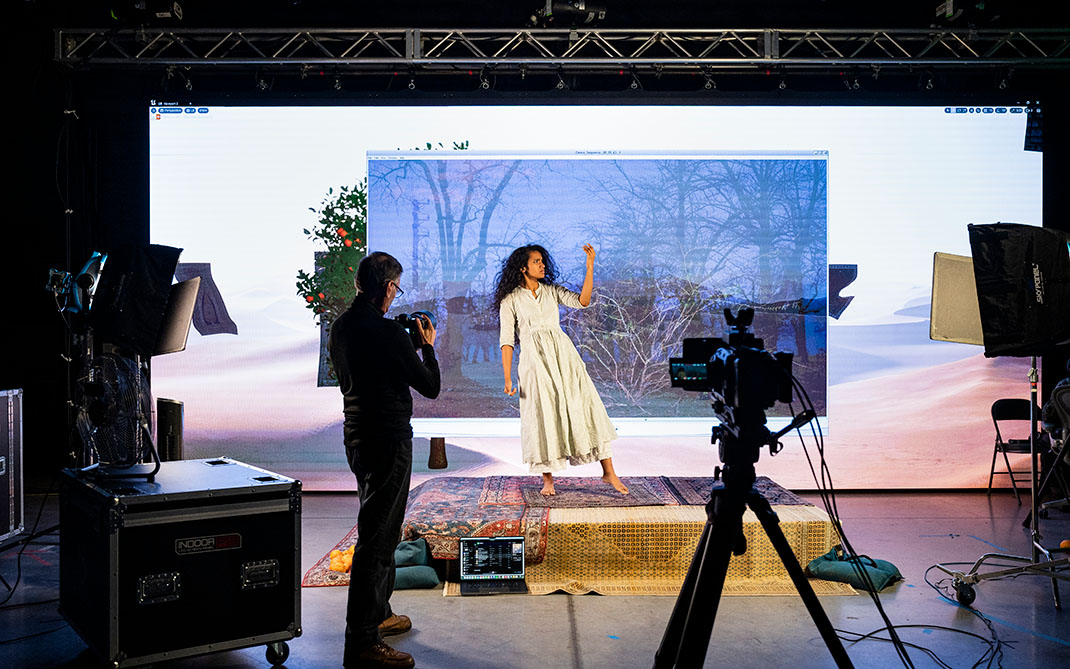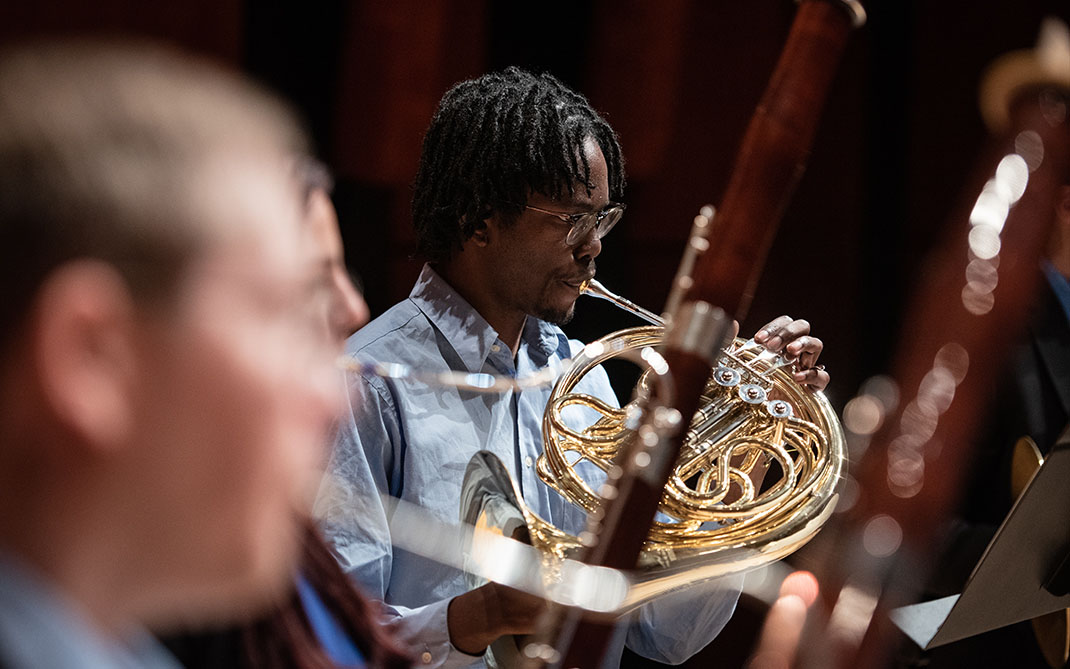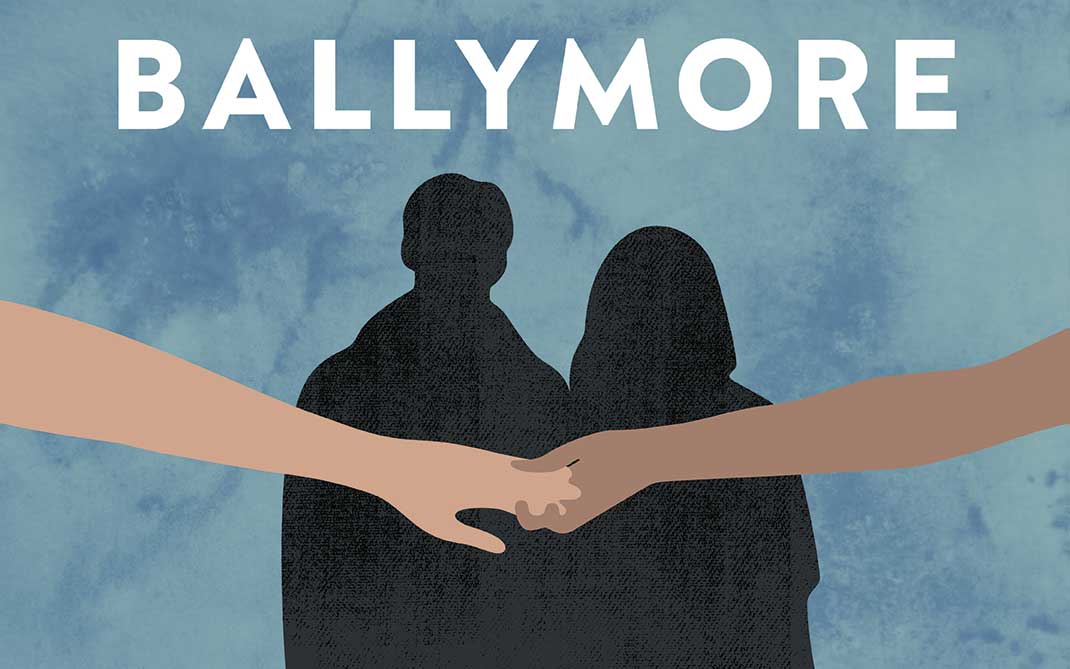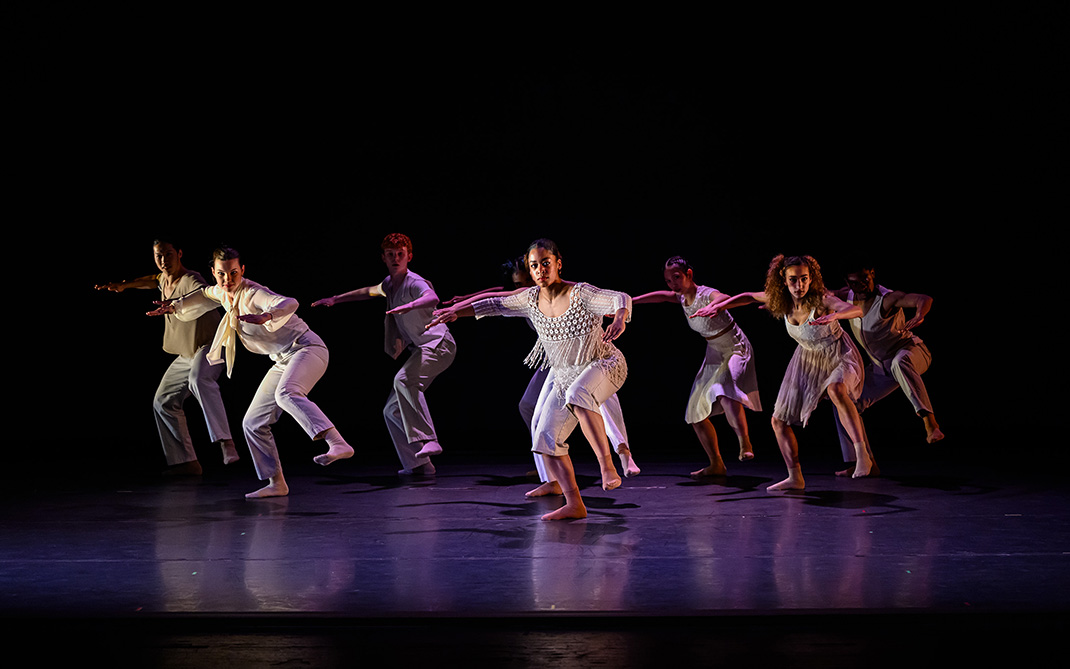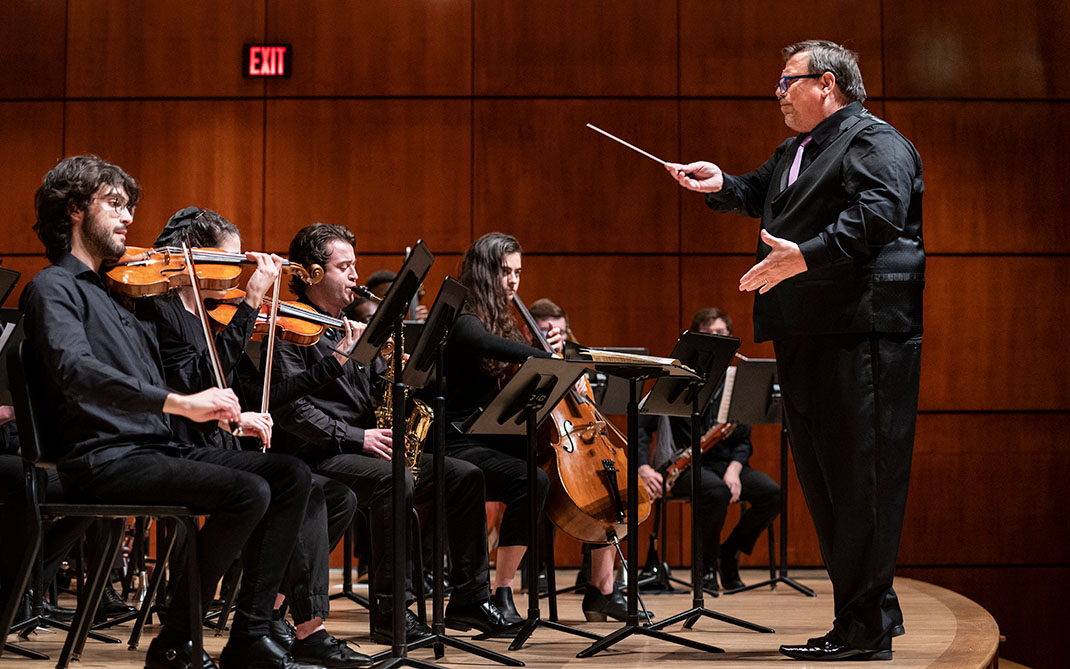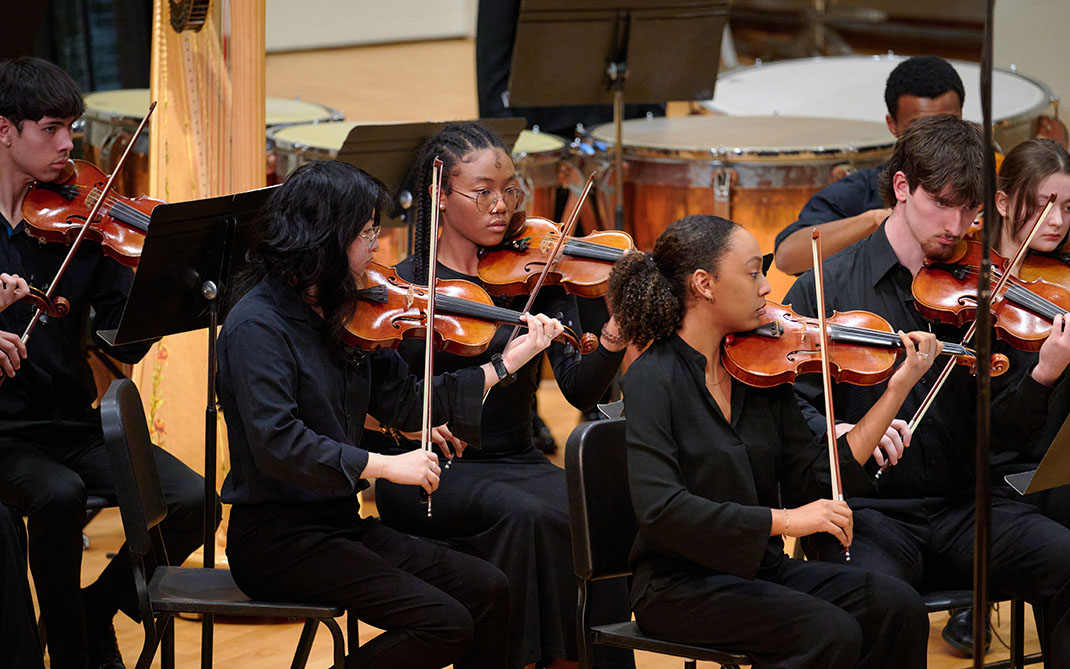Collaboration builds social capital through the arts
One by one, about a dozen children file into the multi-purpose room for a dance class at Willows Peake Apartments in the Happy Hill neighborhood.
Brightly colored mats await the students inside. With an occasional reminder, most dutifully slip off their shoes, pull on a pair of purple grip socks and settle into the proper seating position for a warm-up routine.
Monica Johnson surveys the room, then gives co-instructor and younger brother, Jerome Johnson, a nod to begin the music. What follows in the next hour is a combination of ballet and creative movement for elementary-school kids with little or no dance experience.

Monica Johnson works with students in the Happy Hill Arts Afterschool Program.
The Johnson siblings, both alumni of the School of Dance (opens in new tab) at the University of North Carolina School of the Arts, have come full circle.
Years ago, when they were children themselves, the Winston-Salem natives received scholarships to attend UNCSA’s Preparatory Dance Program (opens in new tab). Their mother, Evelyn, had overheard a coworker talking about the program for aspiring young dancers and inquired on their behalf.
Both went on to become accomplished dancers — Monica performed with professional companies in West Palm Beach and Atlanta before turning her attention to teaching in Washington, DC; Jerome headed straight to the New York City Ballet (opens in new tab).
... to come back to my hometown to give back those same opportunities that I was given, to share that with children, it is a full circle for me. It is everything I’ve always wanted to do.
Monica Johnson
“If they didn’t have the Preparatory Program when Jerome and I were young, we wouldn’t have been able to experience any of the opportunities we were given to become professional dancers,” says Monica, who returned home to Winston-Salem a few years ago and opened a private dance studio with her brother.
“Now to come back to my hometown to give back those same opportunities that I was given, to share that with children, it is a full circle for me. It is everything I’ve always wanted to do.”
This dance class is part of Happy Hill Arts (opens in new tab), a place-based arts initiative aimed at strengthening community pride and cohesion in the historically African American neighborhood adjacent to UNCSA. Collaborators include the Happy Hill Neighborhood Association, the UNCSA School of Dance, the Thomas S. Kenan Institute for the Arts (opens in new tab) and other partners.
Artists of color lead a variety of cultural arts activities for Happy Hill youth to enhance their educational opportunities, from dance and drumming to photography and storytelling.

The founders of Happy Hill Arts, Amatullah Saleem and Rebecca Bryant Williams, also a UNCSA alumna, recently won The Winston-Salem Foundation’s prestigious ECHO Award (opens in new tab), which honors people and organizations in the city who are instrumental in building social capital. Both women are artists who helped revive the Happy Hill Neighborhood Association in 2015 and now serve as officers. And both are passionate about breaking down the barriers that have separated the neighborhood from the arts school for decades.
What we are doing is creative. When children participate in arts projects their imagination is expanded, they begin to think creatively, they begin to work in teams and they learn skills that are transferrable to their academic work.
Amatullah Saleem
“We are using the arts to address the challenges of helping our communities grow in a positive way,” explains Saleem, who approached the Kenan Institute in 2016 for assistance with developing the program.
“What we are doing is creative. When children participate in arts projects their imagination is expanded, they begin to think creatively, they begin to work in teams and they learn skills that are transferrable to their academic work," she says. “For example, they are able to listen more attentively and their behavior becomes more positive.”
The Kenan Institute provided seed funding, professional development opportunities and grant writing support for Happy Hill Arts, and connected Saleem and Williams with Susan Jaffe, Dean of the UNCSA School of Dance.
Jaffe jumped at the opportunity to partner with the Happy Hill neighborhood. Turns out she already had talked with Monica Johnson about similar work that she did while teaching at The Washington School of Ballet.
“I thought, hallelujah! I had wanted to do engagement of this kind for a long time, but had not had the time or the faculty to do it,” Jaffe says, adding that the four women began meeting regularly with the Kenan Institute to plan a pilot program for the summer.
Jaffe, a principal dancer with American Ballet Theatre (opens in new tab) for 22 years, says it was dance that gave her purpose as a child. She feels it is her duty to share the art with other young people, particularly those with few opportunities to experience it on their own.
“When I was a child, I didn’t feel like I was a part of what was going on in school and home life was difficult. The only place that I felt alive and full of love and creativity was dance class. Dance helps young people to tap into the creative and beautiful human beings that they are,” she says.
“Dance builds communities —it helps young people who feel disenfranchised to connect more with their community. They are much more likely to graduate from high school and live happier and healthier lives.”
Connecting with community is a critical element of Happy Hill Arts’mission. A part of the original colonial settlement of Salem, Happy Hill became one of the first places in the South where African Americans could purchase property in the 1870s (opens in new tab). Nearly 100 years later, the community fell victim to systemic racism and urban redevelopment that eroded its cohesiveness.

Amatullah Saleem with Happy Hill Arts Afterschool Program Youth.
“Many of the people who used to live in Happy Hill don’t live there anymore — they were forced to move out. And the people who live there now, many of them don’t know it is a historic community and its ties to Old Salem (opens in new tab). We are trying to revitalize all of that,” Williams explains.
“It is important that they understand that the history of Happy Hill is every bit as important to the history of Winston-Salem as Old Salem is,” Williams adds. “Your history tells you who you are and what your value is. If you don’t have that foundation, you are not rooted in anything.”
Corey Madden, Executive Director of the Kenan Institute, agrees. She remembers moving to Winston-Salem in the 1970s to attend the arts conservatory and then returning in 2013 to lead the Institute. Little had changed, including the separation she sensed between UNCSA and the community.
A child’s potential is something we cannot afford to leave untapped, and this program uses the arts to give young people in Happy Hill an opportunity to thrive.
Corey Madden
“The Kenan Institute is dedicated to building and strengthening connections between the University and its neighbors," Madden says. “The arts can be such a powerful catalyst for people and places, and there are many opportunities for the school to partner the extraordinary talent on campus with local artist leaders to make a positive impact on the creative community that surrounds it.”
“A child’s potential is something we cannot afford to leave untapped, and this program uses the arts to give young people in Happy Hill an opportunity to thrive.”
By all accounts, last summer’s program was a success. Williams says that organizers noticed a significant transformation in the behavior of the students: “It was really eye-opening to see how the children changed in just six weeks. They were able to increase their focus, and they got a greater appreciation for the importance of discipline and paying attention.”
Such positive outcomes are supported by research.
A 2012 large-scale, longitudinal study by the National Endowment for the Arts (opens in new tab) found that children who are exposed to intensive arts experiences not only perform better academically than their peers who are not, they also become more socially active citizens.
All of the partners in Happy Hill Arts supported adding an after-school component to the program this year, which has expanded the neighborhood’s ability to interact with the UNCSA community when school is in session and the campus is alive with programming opportunities.

Exposing children to the arts, Williams says, is an effective way to tap into their potential. “For African American children in particular, it is important to be able to see people who are successful and who have the same color skin as yours, to realize that that is not a barrier, it is actually an asset.”
The summer program culminated with a well-received performance for families, neighbors and friends during which the children’s work was showcased and celebrated.
Dean Jaffe was in the audience that day, too.
I sat there with my hands on my heart, tears in my eyes and a huge smile on my face through the entire performance. I could really see the value of what they had gotten out of it. …There was so much that was so good.
Dean Susan Jaffe
“I sat there with my hands on my heart, tears in my eyes and a huge smile on my face through the entire performance,” she recalls. “I could really see the value of what they had gotten out of it. …There was so much that was so good.”
Jaffe was particularly taken with the talent displayed by fifth-grader Keturah Kindle and talked with the girl’s mother during a break in the performance:
“She said to me, ‘My biggest dream is for my daughter to go to the UNCSA program.’
“I said, ‘If I can find a scholarship for her, will you promise me that you will get her to class every day?’
“She said, ‘I will. If it takes the whole neighborhood, we will get her there.’”
Keturah, who dreams of one day becoming a professional ballerina, has attended the Preparatory Dance Program ever since —just like her instructors Monica and Jerome Johnson did when they were children with big dreams.
“Keturah was one of those students who never would have had the opportunity to discover her dream, her talent, to be a dancer. She has a talent that can be grown and nurtured,” Monica says.
“It’s a reminder of how important it is to have programming like this in the community.”
June 01, 2018
